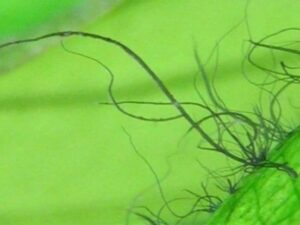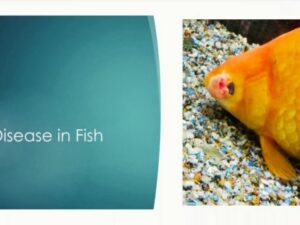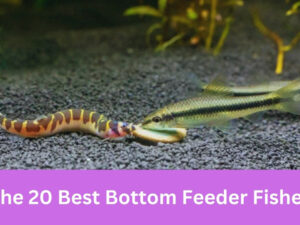The Sunshine Pleco (Scobinancistrus aureatus), also known as the Golden Nugget Pleco, or by its Supported L-number, L-014, is a freshwater fish native to South America. It gets its name from its beautiful golden coloration.
This is a peaceful fish that does well in community tanks. It is a hardy fish that is relatively easy to care for, making it an excellent choice for beginner aquarists.
With proper care, it can live for up to 10 years. In this article, you will learn how to care for the sunshine pleco fish.
Table of Contents
- Species Summary
- Sunshine Pleco Care Guide
- Sunshine Pleco Food & Diet
- Sunshine Pleco Diet Foods To Avoid
- Sunshine Pleco Tank Size
- Sunshine Pleco Tank Mates
- Tank Region
- Tank Decorations
- Heater
- Filter
- Lighting
- Water changes
- Gravel Vacuuming
- Substrate
- How To Clean The Tank?
- Important Point
- What About Freshwater Aquarium Plants?
- Sunshine Pleco Potential Diseases
- Preventing Fish Diseases
- Treating Fish Diseases
- Medications For Diseases
- Advantages Of Having Sunshine Pleco In Your Tank
- Disadvantages Of Having Sunshine Pleco In Your Tank
- Conclusion
Species Summary
| Scientific Name | Scobinancistrus aureatus |
| Common Name | Sunshine Pleco |
| Family | Loricariidae |
| Care Level | Easy |
| Temperament | Peaceful |
| Coloration | Golden |
| Lifespan | 10-15 years |
| Size | 10-12 inches |
| Diet | Omnivore |
| Minimum Tank Size | 125 gallons |
| Water Conditions | 74°-84°Fahrenheit |
| pH level | 6.0 to 7.2 |
| Water Hardness | Up to 30 dKH |
The Sunshine Pleco is a beautiful freshwater fish native to South America. It gets its name from its stunning golden coloration.
This pleco can grow up to 12 inches in length and prefers water with a temperature between 74° to 84°Fahrenheit, a pH of 6.0 to 7.2, and a water hardness of up to 30 dKH. It can live for up to 10 years with proper care.
It is a nocturnal fish that spends most of its time hiding in caves and other dark areas of the tank.
It is a peaceful fish that does well in community tanks. It is an omnivore that feeds on algae, detritus, and small invertebrates.
Providing this fish with a spacious tank with plenty of hiding places is essential. An aquarium with at least 125 gallons is recommended.
The Sunshine Pleco is a relatively inexpensive fish. It can be bought for around $10.
Check Black Neon Tetra 101: Best Care Guide, Species Summary & All
Sunshine Pleco Appearance
The Sunshine Pleco is a beautiful fish that is golden in color. It has a long, slender body with a broad head. This pleco has large eyes and a small mouth. It has three pairs of barbels on its face, which it uses to detect food.
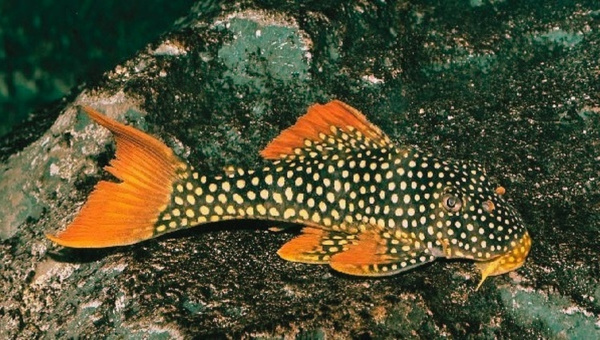
It has a flattened underside and suckers on its belly, which it uses to attach to rocks and other surfaces. Its dorsal, pectoral, and tail fins are dark in color.
They can live for up to 10 years in captivity and up to 15 years in the wild.
Providing this fish with a spacious tank with plenty of hiding places is essential. An aquarium with at least 125 gallons is recommended.
he Sunshine Pleco is different from other plecos because it is brightly colored. This fish is also smaller than most other plecos.
Sunshine Pleco Size And Growth Rate
It grows to an average size of 10-12 inches. However, some specimens can reach up to 14 inches in length.
Also, check Neon Tetra Care Guide: Appearance, Breeding & All
Shedding And Body Patterning
This is a scaleless fish, which means it does not have any scales on its body. Instead, this pleco has smooth, slimy skin.
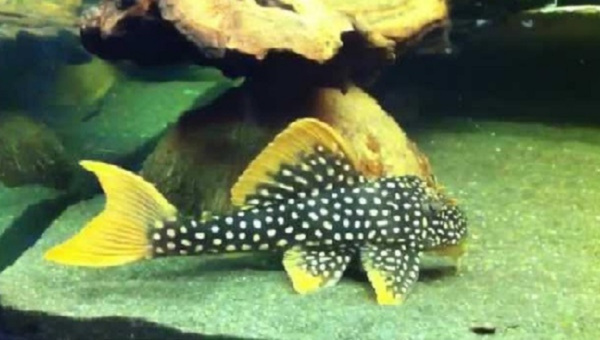
Its skin regularly removes parasites and other toxins from its body. This pleco also has exciting patterns on its body that can change color depending on its mood.
Origin And Distribution
The Sunshine Pleco is native to South America. It is found in Brazil, Colombia, Ecuador, Peru, and Venezuela. It prefers slow-moving rivers and streams with plenty of hiding places.
In the wild, this fish is often found among rocks and plants. In the aquarium, they should be provided with plenty of hiding places, such as caves and driftwood.
Sunshine Pleco Breeding And Reproduction
This is a livebearing fish, giving birth to live young. The female will carry the eggs in her mouth until they hatch. After the fry is born, the female fish will often eat them.
Removing the female from the tank after she has given birth is essential to prevent her from eating the fry.
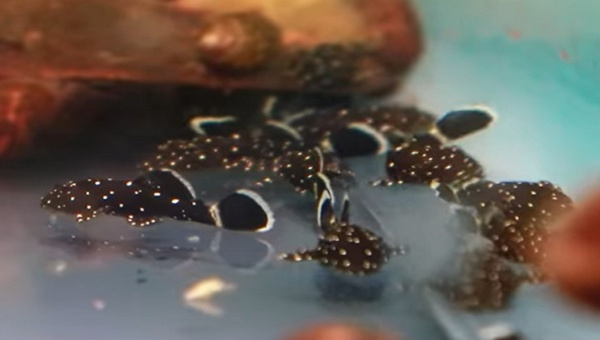
It is essential to condition the parents before breeding. This can be done by providing them with a nutritious diet and plenty of swimming space. The parents should also be of similar size to prevent injury during spawning.
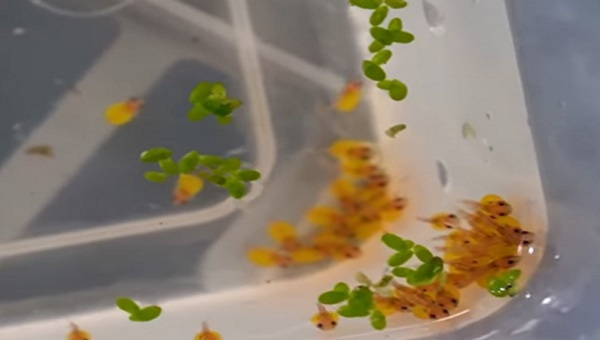
The Sunshine Pleco can be bred in an aquarium or a fish tank. If breeding in an aquarium, it is essential to provide plenty of hiding places. The aquarium should also have a filter and a heater to maintain the water temperature.
Also, check Emperor Tetra 101: Care, Breeding, Lifespan, Diet
Gestation Period And Pregnancy Symptoms
The gestation period is about 28 days. During this time, the female will become increasingly aggressive. She may also start to build a nest out of plants and rocks.
The Pleco does not make a good parent. The female is known to eat her fry. Removing the female from the tank after she has given birth is essential to prevent her from eating the fry.
Feeding The Fry
The Sunshine Pleco fry should be fed small live foods such as brine shrimp and bloodworms. The fry can also be fed commercial pleco pellets. Providing the fry several times a day in small amounts is essential. As the fry grows, more significant live foods and pellets can be fed.
Also, check Cardinal Tetra 101: Species Summary & Ultimate Care Guide
Sunshine Pleco Temperament
This is a peaceful fish that gets along well with other tank mates. However, this pleco can be territorial and aggressive towards other plecos. Providing this fish with plenty of hiding places is essential to reduce aggression.
This is nocturnal and will often hide during the day. It is a peaceful fish that gets along well with its owner.
You may also check Rummy Nose Tetra 101: All You Need To Know
Sunshine Pleco Care Guide
Here, we will share all the essential things used to give the best care.
Sunshine Pleco Food & Diet
They are omnivores and require a diet that includes plant and animal matter. They can eat algae from the tank. However, this is not a guarantee. Providing this pleco with a varied diet that includes plants and animals is essential.
Suggested foods are:
- Algae wafers
- Blood worms
- Brine shrimp
- Crickets
- Mealworms
- Sinking pellets
- Zucchini
Sunshine Pleco Diet Foods To Avoid
Certain foods should be avoided
These foods include:
- Avocados
- Cherries
- Chocolate
- Coffee
- Mushrooms
- Onions
- Peanuts
- Tomatoes
Sunshine Pleco Tank Size
The Sunshine Pleco requires a tank size of at least 120 to 125 gallons. This pleco also requires a spacious tank with plenty of swimming space. The tank should be filtered and heated to maintain the water temperature.
Sunshine Pleco Tank Mates
This is a peaceful fish that gets along well with other tank mates. However, this pleco can be territorial and aggressive towards other plecos.
The Sunshine Pleco is nocturnal and will often hide during the day. The Sunshine Pleco is compatible with other peaceful fish.
Good tank mates for the Sunshine Pleco include:
Tank Region
This is a bottom dweller and will spend most of its time near the bottom of the tank.
Tank Decorations
They prefer a tank with plenty of hiding places, such as caves and driftwood. The aquarium should also have a filter and a heater to maintain the water temperature.
Caves and driftwood provide hiding places. The filter and heater help to maintain the water temperature.
Heater
The Sunshine Pleco requires a heater to maintain the water temperature. The ideal water temperature is 74° to 84° Fahrenheit. The heater keeps the water temperature in the tank.
It requires a warm water temperature. The heater helps to keep the water at this temperature.
Suggested heaters are:
- Aqueon Aquarium Heater
- Eheim Jager Aquarium Thermostat Heater
- Hydor ETH 200W External Aquarium Heater
- Fluval E Series 300-watt Electronic Heater
Filter
The Sunshine Pleco requires a filter to keep the water clean and healthy. The filter helps to remove waste and toxins from the water. The tank should be filtered to keep the water clean and healthy.
Suggested filters are:
- Aqueon Aquarium Filter
- Fluval Canister Filter
- Marineland Penguin Power Filter
Lighting
The Sunshine Pleco does not require special lighting. A standard aquarium light will be sufficient for this fish. They do not require special lighting. A standard aquarium light will suffice.
Water changes
The Sunshine Pleco requires weekly water changes of 20% to 30%. The water should be changed every week to keep the water clean and healthy. The tank should be cleaned, and the water changed weekly.
Also, check Best Ruby Tetra Guide ( ): Explained in Details
Gravel Vacuuming
The tank should be vacuumed weekly to remove debris and waste. The vacuum helps to keep the gravel clean and the water healthy.
They may eat algae from the tank. However, this is not a guarantee. It is essential to remove algae manually from the tank to prevent it from taking over.
Substrate
They require a substrate that is soft and sandy. The substrate should be changed every few months to prevent the build-up of toxins.
Suggested substrates are:
- Fluval Fresh and Plant Substrate
- Seachem Flourite Black Clay Gravel
- CaribSea ECO-Complete 20-Pound Planted Aquarium substrates
How To Clean The Tank?
The tank should be cleaned, and the water changed regularly to keep the water clean and healthy. The tank should be vacuumed every week to remove debris and waste.
The gravel should be changed every few months to prevent the build-up of toxins.
To clean Sunshine Pleco’s tank, you will need:
- Aquarium vacuum
- Gravel cleaner
- Freshwater aquarium-safe fishnet
- Aquarium safe gloves
- Aquarium safe soap
- Aquarium safe sponge
- Dechlorinated water
Instructions
- Remove the fish from the tank and place them in a temporary container.
- Turn off and unplug all equipment in the tank.
- Remove all decorations from the tank.
- Using the gravel cleaner, vacuum the gravel and remove any waste.
- Clean the tank’s glass with aquarium-safe soap and a sponge.
- Rinse the decorations in dechlorinated water and set them aside.
- Fill the tank with dechlorinated water and let it sit for 24 hours.
- After 24 hours, drain the tank and refill it with fresh, dechlorinated water.
- Add the decorations back to the tank.
- Turn on and plug in all equipment.
- Add the fish back to the tank.
Also, check Otocinclus Catfish Care Guide: Appearance, Lifespan, Food & Diet, Breeding & All
Important Point
It is essential to regularly test the ammonia levels in Sunshine Pleco’s tank. Ammonia levels should be kept at 0 ppm.
It is essential to regularly test the nitrite levels in Sunshine Pleco’s tank. Nitrite levels should be kept at 0 ppm.
It is essential to regularly test the nitrate levels in Sunshine Pleco’s tank. Nitrate levels should be kept below 20 ppm. Keeping nitrate in a limited range is necessary because it can cause health problems like gill damage, lethargy, and loss of appetite.
It is essential to regularly test the oxygen levels in Sunshine Pleco’s tank. Oxygen levels should be kept at 5 ppm or higher. High oxygen levels can be achieved by using an air stone or powerhead.
A protein skimmer is not required for the Sunshine Pleco. However, it can be beneficial in helping to maintain water quality.
Also, check Butterfly Betta Care Guide: Appearance, food & Diet, Breeding & All
What About Freshwater Aquarium Plants?
Yes, the Sunshine Pleco can live with freshwater aquarium plants. This pleco may help to control algae growth in the tank.
Check Plakat Betta Best Care Guide, Facts & Species Summary
Sunshine Pleco Potential Diseases
The Sunshine Pleco is susceptible to several fish diseases.
These diseases include:
- Ich: Ich is a parasitic disease that causes white spots on the fish’s body. Symptoms of ich are White spots on the body, Loss of appetite, scratching the body on objects in the tank, etc.
- Fin rot: Fin rot is a bacterial disease that causes the fins to become damaged and disintegrate. Symptoms of fin rot are Fin becoming frayed or having missing pieces, Dark spots on the fins; Fins may fall off.
- Swim bladder disease: Swim bladder disease is a condition that affects the swim bladder. This can cause the fish to float upside down or have trouble swimming. Symptoms of swim bladder disease are Floating upside down, Trouble swimming, and Loss of appetite.
- Gill flukes: Gill flukes are parasitic flatworms that attach to the fish’s gills. Symptoms of gill flukes are Labored breathing, Clamped fins, and Scratching the body on objects in the tank.
- Bacterial infections: Bacterial infections can cause various symptoms depending on the type of bacteria. Symptoms may include lethargy, loss of appetite, red streaks on the body, etc.
- Velvet: Velvet is a parasitic disease that causes a dusty yellow or golden film to form on the fish’s body. Symptoms of velvet are Yellow or golden film on the body, Scratching the body on objects in the tank, Rubbing against rocks and gravel, etc.
- Hole in the head: A hole in the head is a disease that causes pits or holes in the fish’s head. Symptoms of holes in the head are Pits or holes on the head, Scaling and flaking of the skin, lethargy, etc.
- Anchor worm: Anchor worm is a parasitic disease that causes worms to attach to the fish’s skin. Symptoms of anchor worms are Worms attached to the skin, red, irritated skin, and Scratching the body on objects in the tank.
- Costia: Costia is a parasitic disease that causes white spots on the fish’s body. Symptoms of costia are White spots on the body, Loss of appetite, and Scratching the body on objects in the tank.
- Flexibacter columnaris: Flexibacter columnaris is a bacterial infection that causes lesions or sores on the fish’s body. Symptoms of flexibacter columnaris are Lesions or sores on the body, lethargy, loss of appetite, etc.
If you notice any of these symptoms in your Sunshine Pleco, it is essential to take it to a veterinarian for treatment.
Preventing Fish Diseases
There are several things that you can do to help prevent fish diseases.
These things include:
- Quarantine new fish before adding them to the tank.
- Keep the tank clean and the water quality high.
- Do not overfeed the fish.
- Avoid environmental stressors, such as drastic changes in temperature or pH.
- Keep the tank well-ventilated.
- Treat the fish with a prophylactic treatment before adding them to the tank.
Also, check Otocinclus Catfish Care Guide: Appearance, Lifespan, Food & Diet, Breeding & All
Treating Fish Diseases
If your Sunshine Pleco does become sick, it is essential to take it to a veterinarian for treatment. There are a variety of treatments available for different fish diseases.
Some common treatments include:
- Antibiotics: Antibiotics are used to treat bacterial infections.
- Antiparasitic medications: Antiparasitic medications are used to treat parasitic infections.
- Surgery: Surgery may be necessary to remove parasites or tumors.
- Supportive care: This may include changing the water quality or adding a protein skimmer to the tank.
Fish diseases can be severe and even deadly, so it is essential to take precautions to prevent them. If you notice any disease symptoms in your Sunshine Pleco, take it to a veterinarian for treatment.
Medications For Diseases
There are a variety of medications available for treating fish diseases.
Some common medications include:
- Oxytetracycline
- Kanaplex
- Metronidazole
- Diff
- Neomycin
- Sulfadimethoxine
- Nitrofurazone
- Enrofloxacin
- Tetracycline
- Amikacin
From the 5th to the 10th, medications are antibiotics used to treat bacterial infections. It is effective against many bacteria, making it a valuable medication for treating many fish diseases like flexibacter columnaris.
Also, check Cardinal Sulawesi Shrimp 101: Care Guide & Breeding Guide
Advantages Of Having Sunshine Pleco In Your Tank
- Peaceful: This is a peaceful fish that can be kept with other peaceful fish.
- Active: This is an active fish that will swim around the tank.
- Easy to care for: This is easy to care for and does not require special attention.
- Hardy: This hardy fish can withstand water quality and temperature changes.
- Long-lived: it is a long-lived fish that can live for up to 20 years with proper care.
- Good beginner fish: Good beginner fish because it is easy to care for and hardy.
- Attractive: Sunshine Pleco is an attractive fish with a dark body and bright yellowfins.
- Good algae eater: They are good algae eaters and will help to keep the tank clean.
- Good community fish: A good community fish because it is peaceful and easy to care for.
- Fun to watch: Fun to watch as it swims around the tank and cleans up algae.
You may also check Bamboo Shrimp Care Guide, Appearance, Size, Diet, & All
Disadvantages Of Having Sunshine Pleco In Your Tank
- Can be aggressive: They can be aggressive towards other fish if it feels threatened.
- Needs a large tank: It needs a large tank because it is an active swimmer.
- Can be difficult to find: It can be difficult to Sunshine Pleco requires special care and attention.
- Can be expensive: They can be expensive to purchase.
- Can be difficult to care for: They can be difficult to care for if you are unfamiliar with their needs.
- May not do well in a community tank: It may not do well in a community tank because of its aggressive nature.
- Can be finicky eaters: They can be finicky eaters and may not eat all kinds of food.
- Can be messy eaters: They can be messy eaters and may make a mess of the tank.
- May not get along with other fish: They may not get along with other fish because of their aggressive nature.
Also, check Ghost Shrimp 101: Best Detailed Care Guide
Conclusion
The Sunshine Pleco is a peaceful fish that is easy to care for. They are active swimmers and require a large tank. They are good beginner fish because they are hardy and do not require special care. They are also good algae eaters and help to keep the tank clean.
The Sunshine Pleco can be aggressive towards other fish, so they may not do well in a community tank. They can also be finicky eaters, so it is important to offer them a variety of foods. Overall, the Sunshine Pleco is a good choice for a pet fish.

